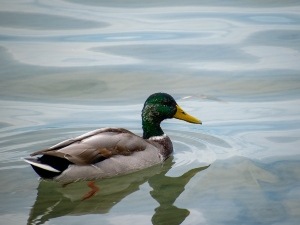
A change in your duck’s behavior can be very alarming, especially if the change in your duck is quite a big change, like the duck suddenly being on its back.
If you’re wondering why this is happening and wondering what you can do about it, read on
Table of Contents
Duck on its back:
A duck living its life while upright is normal and commonplace, if your bird is suddenly on its back then this can be because of one of two reasons, either the bird has wry neck or because the bird has toxoplasmosis.
Here is what you need to know about both conditions:
Wry neck:
Wry neck is more common in younger ducklings but it is a condition that can affect your adult-aged ducks as well.
If an older duckling has a nutrient deficiency then the bird can develop wry neck.
This condition is also called star gazing because it causes the affected bird to have a bent neck making the bird appear as though it is looking up at the sky and stars.
A bird with this condition isn’t able to hold its head up on its own, its neck will bend because of this. Other symptoms of this ailment include the bird falling onto its back and not being able to walk.
Causes of wry neck in ducks can vary from nutritional deficiencies, a head injury, genetics, and ingesting toxins to name a few.
What to do:
The first thing that you’d need to do is to isolate the affected bird, if you leave the bird with the rest of its flock then the healthy birds may realize that one bird is sick and will peck at it
You can separate the ill bird from the rest in order to keep this pecking from happening.
You may also need to hand-feed the bird as it likely won’t be able to eat on its own.
If the wry neck is caused by a vitamin deficiency then the bird is likely lacking in vitamin E. Treat this condition by giving the bird vitamin E as well as selenium which will boost the effects of vitamin
A vitamin B1 deficiency can also be the reason behind your bird’s wry neck, if this is the case then supplement this nutrient into your bird’s diet.
Food sources of vitamin B1 include wheat germ, bran, sunflower seeds, and brewers yeast.
If given treatment consistently then your bird should gradually get better. The bird won’t recover from this ailment immediately after being given treatment. The remedy can take a week or longer to start showing results.
Toxoplasmosis:
Toxoplasmosis is another condition that can negatively affect your ducks, not only can it affect ducks but it can also affect reptiles mammals, and other birds.
Sometimes waterfowl, like ducks, can be asymptomatic and thus won’t show signs of being ill, but this isn’t the case with all ducks all of the time
Signs, other than the bird being on its back, that would indicate that the bird is suffering from this ailment include, the inability to get up after flipping on its back, weight loss, congestion, trembling, blindness, a drop in egg production, paleness, diarrhea
What to do:
The bird may develop exhaustion as a result of trying to get back upright after falling over. The bird may even starve because it can’t get access to food and water because of its condition. You would need to hand-feed the bird if this happens.
You’d need to quickly treat the bird as soon as you can before the bird develops permanent ataxia and incoordination.
If the bird’s ailment is not addressed then the other birds may end up trampling on the sick bird and dying as a result.
The treatment option for this ailment is a medication called pyrimethamine. This is a medication that needs to be given over 7 to 10 days.
However, because this medication can be highly toxic to your ducks you would need to use it for a maximum duration of 2 weeks or under. Folic acid can be used to relieve some of the toxicity that the bird will be exposed to
Taking your bird to the vet to be examined and diagnosed is recommended.
If you enjoyed this article then you may also be interested in other chicken related articles. Here are some articles that you may be interested in: Duck Is Choaking, Duckling Flipping On Its Back, Duck With A Runny Nose, Pekin Duck Swollen Leg, Why Is My Duck Drooling?

